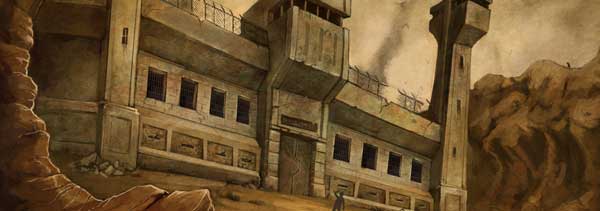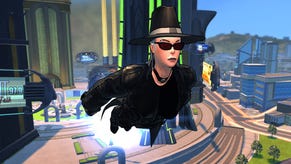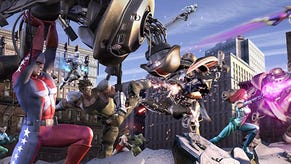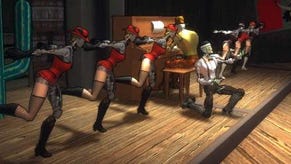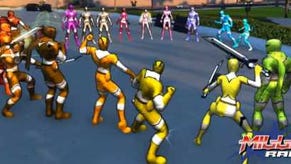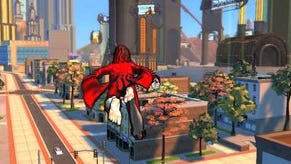They Are The Champions Online: George MacDonald
With twenty five years of history, there's more to Champions than Cryptic's forthcoming game. Present, and putting the game into its context, was original pen-and-paper designer George MacDonald. We grabbed an opportunity to chat to him about the history the Superhero role-playing game, the power of game mechanics to create emotions and how gargantuan Cryptic's intellects are...
RPS: Looking back to the early days of Champions, I'm interested in what pushed you towards its points-based designing character approach. It seemed a big leap.
George MacDonald: There had been a couple of other games that had used a point based system, but a part of it was that I'd just felt rolling dice for a character was inherently unfair. Because someone would roll great dice, and have a great character. And someone else would roll crappy dice, and have a crappy character. Fairness in games is something that's really important to me. I never got into Magic [: The Gathering] because I felt it was inherently unfair, because your deck – if you spent more money – could be better than my deck. I think that's where the first part of distributing points around came from. And then the idea of letting characters make what they want required some kind of way to balance between things – there was actually a fellow I was at a convention who had done a points based thing for an old superhero roleplaying game and I was inspired by what he did. I went – Oh! That's a cool idea. And we applied it to everything we could come across.
RPS: I also thought it's interesting in that it was about fairness, but seemed to become a meta-game about getting the most power from every half-point.
MacDonald: Well, the game is incredibly vulnerable to power-gaming. I think ultimately there's a social contract that's between the players and the person running the game that basically says – “Yes, that is legal, but no you can't play that”. Or – “Oh wow: that's a really inefficient build – I'm going to give you some slack on something else because you're making a character because it's really cool and it's what you want”. I think the points were always a guideline as much as anything else, and there's lots of places in the rules which say You Can Only Do This With A Gamesmaster's Permission. Or... how much is this worth? “Well, it's a disadvantage.... if you take it as a five point disadvantage, it's not that big a deal. Take it as a fifteen point disadvantage? I'm going to hammer you with it every time. How do you want it?” If you're having a good time, you're playing it right. If you're not, then you're not.
RPS: There's been so many different incarnations of the game, it must be interesting to see stuff done later to your original creation. How do you respond to it?
MacDonald: Well I think it depends on which part of the game. I think the backgrounds and the universe, while I helped to build a lot of the initial pieces, I'm interested to see where people take it. The different revisions, often I just love to read what another cool author has done with it. The first time I read Scott Bennie's take on VIPER [Champions Supervillain Organisation]. It was just like: I never would have done this. This is so cool. Sometimes on the rules, I'd go – oh, I'm not sure that's the call I would have made, but I can see why they did that. And that's reasonable. When I play personally, I tend to use a combination of fourth Edition – which is the last one I was involved with – and fifth edition - which is the most recent one - and a couple of house rules which never got around to being published just for simplicity. And obviously I'll be interested to see what the sixth edition looks like. I haven't had any input on that, but at some point the book will come across my desk and I'll go... ooh! Look what they did.
RPS: This kind of reminds me about something comic creators working for the big companies do. Since it's mostly work-for-hire situation, they don't own the characters and they'll continue after they're no longer doing it, and how people respond to that leads to some interesting reactions. There's not that many creative fields where you have that situation - but a five-revision RPG system that's been rebuilt across twenty five years may be one of them.
MacDonald: It's not necessarily just five revisions- it's five creative teams who've done the different revisions. I think every team brings something different to it. I often felt what a lot amateur – and I was amateur at the beginning, and small-press along the way – are trying to do is to try to re-create for everyone else some gaming-experience which they're having, and having a good time with. They write the rules, they write the descriptions, they write the notes for the gamesmaster and everything else to try and make that happen. And when a new creative team takes over, they have a different set of experiences. To them, the HERO system – or whatever else they're doing – is a completely different thing. It's influenced by the first one, but it's not encompassed by it. So when they do the revision they include the thing which is important to them. And I think that happens in any long-running fiction which people revise along the way.
RPS: People from outside gaming don't always seem to get the idea that mechanics are expressive – in the mechanics you choose create and encourage different emotional responses.
MacDonald: Absolutely. I'm a games-mechanic fanatic. It's absolutely what I believe. It's the physics of the universe, it's how you express choices that are dramatic and the ones that aren't dramatic. It's the things that make you smile, because they're interesting or they're destructive, to the things you find fair and unfair. I think game mechanics are very much the way you create dramatic structure.
RPS: What sort of conversations do you have people who work in videogames?
MacDonald: Well, I was in the videogame industry for about twelve years. I worked at SSI doing the AD&D games – the old Gold Box games, and then the Eye of the Beholder games.
RPS: Which were great.
MacDonald: At the time, they were fabulous. I had a lot of fun with those games. Then I went over to Accolade and did more sports and strategy things. And then I worked at the Internet Chess club, which got me into the Internet... but one of the things I found when I was talking to the Cryptic guys... well, for first, they're incredibly smart. I get used to walking into a room with a lot of game designers, and thinking “I'm in the top ten-percent here”. I'm arrogant, but... well. Here I'd walk into the room, and I'm fighting to stay in the top 50%. These are guys who love games, and understand that metagame that you're talking about – that every decision that you're making is “Is this more fun for the player”. If I tweak the game this way, is this more fun, or is that more fun? Is that choice annoying and destructive? This stuff isn't random. They make those choices because they're really smart.
Our Champions coverage continues tomorrow with details of the character creator's possibilities.


